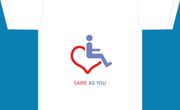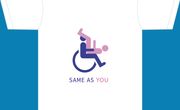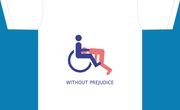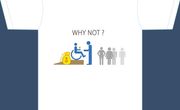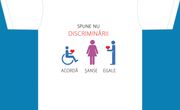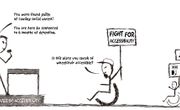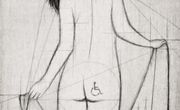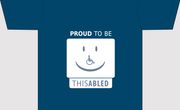Marhaban!
The discrimination of disabled people is omnipresent in the society. Even in civilized countries, it still manifests on many levels, e.g., low presence and representation in the media (movies and TV shows), poorly accessible infrastructure and transportations means. In underdeveloped countries, the situation is much more dramatic. Such a person may not even be able to read, because s/he would not get access to any education, out of sheer carelessness. In other contexts, a device with Internet access is not a commodity, but a luxury item. To understand discrimination as a phenomenon and know how to deal with it, you should:
- Read literature on disabled people, such as, what it means to be an emancipated disabled person. Only through reading about what kind of prejudices are out there against disabled people, you can learn to observe subtle forms of discrimination that most people are not even aware they employ; even some disabled people do not notice them.
- Know your human rights, and the associated international treaties and laws that apply irrespective of disabilities in any of the signatory countries.
- Know the local laws and rights. Look for them on the official sites of the government of the country or state you live in.
- Learn, be curious, be determinate and be assertive. Discrimination prevails because of ignorance, our ignorance as well.
- Try to engage other people to help you fight against discrimination.
Most likely, if you are a disabled person, no one will bother to tell you what rights you have, e.g., a disability pension or free tickets to public concerts. You might not be informed even when you are entitled to specific services for your condition. You need to know your rights and demand their implementation, according to each social context you find yourself in. Be assertive and not obedient or compliant. For example, do not accept being refused to get a free ticket, if there is a law stating you are entitled to it.
Whenever you can, ask to talk with the superior authority, to get clear and well-documented explanations as to why you are denied what you know for sure the law entitles you to. It often happens that the people selling something or providing a service are not aware of the relevant legislation for their workplace. Name the laws and be precise, speak eloquently. Print or save on your smartphone the relevant sections to have them at hand, in case you have to be even more persuasive.
Voice your concerns and make people aware of how and when you are being discriminated. Denounce every form of social or institutional discrimination you face. Do it on social networks as well. Make yourself heard. Be vocal! Otherwise, we cannot raise awareness on the issues disabled people face. Sympathize with other communities of disabled people, not just with the one you are a part of. We all must act united in our causes.
Try to engage your friends or, at least, your family to support you in your endeavors. When you interact with the local authorities, you might need help or assistance. Entice your representative(s) to refuse any form of discrimination on your behalf, to be persistent and strong on his or her position, to fight for inclusion. If you know a particular law should apply in your case as well, but you are denied, explain it to your family members. They should be your strongest allies against discrimination and in the fight for emancipation.
Friends or acquaintances that discriminate against you should be avoided entirely. If you are discriminated in less obvious ways, explain it to them, make them aware of it. Denounce discrimination, even when it happens in your family.
When you go out in public, if people suddenly insult you or attempt to bully you, answer with ignorance. Do not stop from your ride, move on. Take these things lightly. Refuse the people that want to pray or give you "the good news", and even those who want to give you money. Show people you have a spine.
And be courageus! Go out whenever possible. Let people see disabled people exist out there in the world.
PS. This article was extracted from my e-book on people with disabilities.
Ciao!

